Caroline Leavitt's Blog, page 35
November 25, 2016
And now for something different, Watch out for the astonishingly timely new film by Michael Medeiros, 3 Minutes, about courage, loss of innocence, gun violence and community
<!-- /* Font Definitions */ @font-face {font-family:"MS 明朝"; mso-font-charset:78; mso-generic-font-family:auto; mso-font-pitch:variable; mso-font-signature:1 134676480 16 0 131072 0;} @font-face {font-family:Verdana; panose-1:2 11 6 4 3 5 4 4 2 4; mso-font-charset:0; mso-generic-font-family:auto; mso-font-pitch:variable; mso-font-signature:3 0 0 0 1 0;} @font-face {font-family:"Cambria Math"; panose-1:2 4 5 3 5 4 6 3 2 4; mso-font-charset:0; mso-generic-font-family:auto; mso-font-pitch:variable; mso-font-signature:-536870145 1107305727 0 0 415 0;} @font-face {font-family:Cambria; panose-1:2 4 5 3 5 4 6 3 2 4; mso-font-charset:0; mso-generic-font-family:auto; mso-font-pitch:variable; mso-font-signature:-536870145 1073743103 0 0 415 0;} /* Style Definitions */ p.MsoNormal, li.MsoNormal, div.MsoNormal {mso-style-unhide:no; mso-style-qformat:yes; mso-style-parent:""; margin:0in; margin-bottom:.0001pt; mso-pagination:widow-orphan; font-size:12.0pt; font-family:Cambria; mso-ascii-font-family:Cambria; mso-ascii-theme-font:minor-latin; mso-fareast-font-family:"MS 明朝"; mso-fareast-theme-font:minor-fareast; mso-hansi-font-family:Cambria; mso-hansi-theme-font:minor-latin; mso-bidi-font-family:"Times New Roman"; mso-bidi-theme-font:minor-bidi;} .MsoChpDefault {mso-style-type:export-only; mso-default-props:yes; font-family:Cambria; mso-ascii-font-family:Cambria; mso-ascii-theme-font:minor-latin; mso-fareast-font-family:"MS 明朝"; mso-fareast-theme-font:minor-fareast; mso-hansi-font-family:Cambria; mso-hansi-theme-font:minor-latin; mso-bidi-font-family:"Times New Roman"; mso-bidi-theme-font:minor-bidi;} @page WordSection1 {size:8.5in 11.0in; margin:1.0in 1.25in 1.0in 1.25in; mso-header-margin:.5in; mso-footer-margin:.5in; mso-paper-source:0;} div.WordSection1 {page:WordSection1;} </style> --> <div class="MsoNormal" style="mso-layout-grid-align: none; mso-pagination: none; text-autospace: none;"><br /></div><div class="MsoNormal" style="mso-layout-grid-align: none; mso-pagination: none; text-autospace: none;"><br /></div><div class="MsoNormal" style="mso-layout-grid-align: none; mso-pagination: none; text-autospace: none;"><br /></div><div class="separator" style="clear: both; text-align: center;"><a href="https://3.bp.blogspot.com/-TTgWShJouS..." imageanchor="1" style="margin-left: 1em; margin-right: 1em;"><img border="0" height="100" src="https://3.bp.blogspot.com/-TTgWShJouS..." width="320" /></a></div><br /><div class="MsoNormal" style="mso-layout-grid-align: none; mso-pagination: none; text-autospace: none;"><br /></div><div class="MsoNormal" style="mso-layout-grid-align: none; mso-pagination: none; text-autospace: none;"><br /></div><div class="MsoNormal" style="mso-layout-grid-align: none; mso-pagination: none; text-autospace: none;"><br /></div><div class="separator" style="clear: both; text-align: center;"><a href="https://2.bp.blogspot.com/-C-C_ESEMKJ..." imageanchor="1" style="margin-left: 1em; margin-right: 1em;"><img border="0" height="320" src="https://2.bp.blogspot.com/-C-C_ESEMKJ..." width="256" /></a></div><br /><div class="MsoNormal" style="mso-layout-grid-align: none; mso-pagination: none; text-autospace: none;"><br /></div><div class="MsoNormal"><br /></div><div class="MsoNormal"><br /></div><div class="MsoNormal"><i><span style="font-size: small;"><span style="color: #1a1a1a; font-family: "verdana";"><a href="http://www.imdb.com/name/nm0575486/&q... Medeiros</a> is both a talented multi-ranged actor, a brilliant writer and director, and a friend. I first met him through his wonderful darkly comic film Tiger Lily Road, (I almost got a chance to do a voice in the film. He needed someone who sounded weird, and I fill that bill.) Recently I watched a rough cut of his new film, 3 Minutes, and by the end, I was weeping. About family, community, courage, guns and what one brave woman will do for her damaged veteran husband--the film is truly important.</span></span></i></div><div class="MsoNormal"><i><span style="font-size: small;"><span style="color: #1a1a1a; font-family: "verdana";"><br /></span></span></i></div><div class="MsoNormal"><i><span style="font-size: small;"><span style="color: #1a1a1a; font-family: "verdana";">I am so thrilled that he and the others responsible for the film have agreed to talk with me about it. Thank you, thank you, thank you. </span></span></i></div><div class="MsoNormal"><br /></div><div class="MsoNormal"><span style="font-size: small;"><span style="color: #1a1a1a; font-family: "verdana";">First, the info you need to know:<br /><br /><a href="http://www.3minutesthemovie.com/"... MINUTES </a> RT 12:41</span></span></div><span style="font-size: small;"> </span><br /><div class="MsoNormal"><span style="font-size: small;"><span style="color: #1a1a1a; font-family: "verdana";">Written & Directed by Michael Medeiros</span></span></div><span style="font-size: small;"> </span><br /><div class="MsoNormal"><span style="font-size: small;"><span style="color: #1a1a1a; font-family: "verdana";">Cinematographer Nils Kenaston</span></span></div><span style="font-size: small;"> </span><br /><div class="MsoNormal"><span style="font-size: small;"><span style="color: #1a1a1a; font-family: "verdana";">Produced by Ilvi Dulack; Mark Woods</span></span></div><span style="font-size: small;"> </span><br /><div class="MsoNormal"><span style="font-size: small;"><span style="color: #1a1a1a; font-family: "verdana";">Executive Producer Michael Gallis</span></span></div><span style="font-size: small;"> </span><br /><div class="MsoNormal"><br /></div><span style="font-size: small;"> </span><br /><div class="MsoNormal"><span style="font-size: small;"><span style="color: #1a1a1a; font-family: "verdana";">CAST</span></span></div><span style="font-size: small;"> </span><br /><div class="MsoNormal"><span style="font-size: small;"><span style="color: #1a1a1a; font-family: "verdana";">Tommy - Adam Cole</span></span></div><span style="font-size: small;"> </span><br /><div class="MsoNormal"><span style="font-size: small;"><span style="color: #1a1a1a; font-family: "verdana";">Laurie - Inge Uys</span></span></div><span style="font-size: small;"> </span><br /><div class="MsoNormal"><span style="font-size: small;"><span style="color: #1a1a1a; font-family: "verdana";">The Kid - Jacob Leinbach</span></span></div><span style="font-size: small;"> </span><br /><div class="MsoNormal"><span style="font-size: small;"><span style="color: #1a1a1a; font-family: "verdana";">Maddy - Tiz McWilliams</span></span></div><span style="font-size: small;"> </span><br /><div class="MsoNormal"><span style="font-size: small;"><span style="color: #1a1a1a; font-family: "verdana";">Earl - Lee Spencer Osario</span></span></div><span style="font-size: small;"> </span><br /><div class="MsoNormal"><br /></div><span style="font-size: small;"> </span><br /><div class="MsoNormal"><span style="font-size: small;"><span style="color: #1a1a1a; font-family: "verdana";">WEBSITE: </span></span></div><span style="font-size: small;"> </span><br /><div class="MsoNormal"><span style="font-size: small;"><span style="color: #1a1a1a; font-family: "verdana";">FACEBOOK: <a href="https://www.facebook.com/3minutesthem... style="color: #103cc0;">https://www.facebook.com/3minutesthem... /><span style="font-size: small;"><span style="color: #1a1a1a; font-family: "verdana";"><span style="color: #103cc0;"> </span></span></span><br /><div class="gmail_default" style="font-family: verdana,sans-serif; font-size: small;">Festivals pay a lot of attention to Social Media presence. Every <a href="https://www.facebook.com/3minutesthem... "like" helps.<br /><a data-saferedirecturl="https://www.google.com/url?hl=en&..." href="https://www.facebook.com/3minutesthem..." target="_blank"></a><br /></div><div class="gmail_default" style="font-family: verdana,sans-serif; font-size: small;"><a href="https://www.indiegogo.com/projects/3-... page - to help cover post prod expenses and festival entry fees which are higher than ever this year. We are entering a lot of them to try to give the film as wide an exposure as possible.<br /><a data-saferedirecturl="https://www.google.com/url?hl=en&..." href="https://www.indiegogo.com/projects/3-..." target="_blank"></a><br /><br /></div></div><span style="font-size: small;"> </span><br /><div class="MsoNormal"><br /></div><span style="font-size: small;"> </span><br /><div class="MsoNormal"><span style="font-size: small;"><b><span style="color: #1a1a1a; font-family: "verdana";">And now, the interview.</span></b></span></div><div class="MsoNormal"><br /></div><div class="MsoNormal"><span style="font-size: small;"><b><span style="color: #1a1a1a; font-family: "verdana";">This film is so different from your excellently dark comic Tiger Lily Road, which I also loved. What was haunting you that led you to 3 MINUTES?</span></b></span></div><span style="font-size: small;"> </span><br /><div class="MsoNormal"><br /></div><span style="font-size: small;"> </span><br /><div class="MsoNormal"><span style="font-size: small;"><span style="color: #1a1a1a; font-family: "verdana";">MM: Like many people, as so many incidents of gun violence of the last few years unfolded one after another, I developed a sort of aching wish, sincere but unfocused, that something could be done about the problem. So when producer, Mark Woods came to me and proposed that we make this film, I literally leapt at the idea. I wrote the script treatment really fast - I guess because I’d already been psychically onboard for a few years.</span></span></div><span style="font-size: small;"> </span><br /><div class="MsoNormal"><br /></div><span style="font-size: small;"> </span><br /><div class="MsoNormal"><span style="font-size: small;"><span style="color: #1a1a1a; font-family: "verdana";">ID: I come from a long line of story tellers. That was always the thing for me as long as I can remember and still is. Our talk around the table. When my Dad calls and says " how are you whats up whats going on" he is fishing for the story. And I usually have one, that has been on the simmer for a while waiting for the moment. If it is an especially good one we will revisit and review it and chew on it for a while.</span></span></div><span style="font-size: small;"> </span><br /><div class="MsoNormal"><br /></div><span style="font-size: small;"> </span><br /><div class="MsoNormal"><span style="font-size: small;"><span style="color: #1a1a1a; font-family: "verdana";">3 Minutes is the story of what’s happening in our towns and cities and communities . When I read the script it was an immediate "yes" for me. Its a powerful tale of great courage, a love for the ages and the loss of innocence. </span></span></div><span style="font-size: small;"> </span><br /><div class="MsoNormal"><br /></div><span style="font-size: small;"> </span><br /><div class="MsoNormal"><span style="font-size: small;"><span style="color: #1a1a1a; font-family: "verdana";">MW: A lack of comfortable and true self awareness that defines much of our culture. The apparently magnetic pull of group think/speak that takes all the color out of our human processes leaving us with black/white. I want to be a part of something more fluid and personally/culturally challenging than just pulling a lever for A or B. I want a different (kind of) conversation.</span></span></div><span style="font-size: small;"> </span><br /><div class="MsoNormal"><br /></div><span style="font-size: small;"> </span><br /><div class="MsoNormal"><span style="font-size: small;"><b><span style="color: #1a1a1a; font-family: "verdana";">I am wondering if your experience as an actor help you with the incredible nuances in the performances. Can you talk about this?</span></b></span></div><span style="font-size: small;"> </span><br /><div class="MsoNormal"><br /></div><span style="font-size: small;"> </span><br /><div class="MsoNormal"><span style="font-size: small;"><span style="color: #1a1a1a; font-family: "verdana";">MM: Yes, absolutely. I learned from personal experience, many many times that the actor is the play or film. There is no other way for me to look at it. There is a lot that a director can add, even impose but the smart ones know that what communicates the story is the impulse that rides on the actors breath. The actor is doing it right now. And when you see a great actor going through an emotional change right before your eyes, the experience is transformative and magical. And directors had best be creating the space for that. I think my experience as an actor has also helped me to recognize what’s what’s working and what each actor can contribute. We had a great casting director, but truthfully, I was a little nervous about casting this in a smaller talent pool. I had originally spoken to Tom Pelphrey about it - he was so wonderful in Tiger Lily Road - but his career has skyrocketed and he wasn’t available. Then I watched the tapes sent in by Adam Cole and Inge Uys and I couldn’t wait to meet them and I knew I could make the film. </span></span></div><span style="font-size: small;"> </span><br /><div class="MsoNormal"><br /></div><span style="font-size: small;"> </span><br /><div class="MsoNormal"><span style="font-size: small;"><span style="color: #1a1a1a; font-family: "verdana";">And to go back in time: I studied acting with one of the greats in the American theatre, Uta Hagen. She was very big on bringing your own subjective truth to the work. This wasn’t so much a moral imperative, as a practical one. Any talented actor can certainly flounce around the stage and pretend to be something, say angry, and probably convince a lot of people. But the real magic happens when the actor brings a truthful alignment of their own life experience into serving the character in the play or film. There that’s my soapbox.</span></span></div><span style="font-size: small;"> </span><br /><div class="MsoNormal"><br /></div><span style="font-size: small;"><b> </b></span><br /><div class="MsoNormal"><span style="font-size: small;"><b><span style="color: #1a1a1a; font-family: "verdana";">What deeply impressed me was how every minute serves the story, every image is calibrated for force. Even the wife’s shirt and long hair, which made me immediately think of the 1960’s and all that hope, were on target. Was all of this mapped out beforehand or did you improvise?</span></b></span></div><span style="font-size: small;"> </span><br /><div class="MsoNormal"><br /></div><span style="font-size: small;"> </span><br /><div class="MsoNormal"><span style="font-size: small;"><span style="color: #1a1a1a; font-family: "verdana";">MM: Ah well, the 60’s. I have a huge nostalgia for that period and because I experienced some of it as a young person, it kind of feels like home to me. Probably, unconsciously I calibrate a lot in relation to it. We did a costume parade on Laura, I knew I wanted blues for her, and the hard part was that Inge looked good in everything. But this one top was a little bit of a throwback and spoke very quietly. It seemed to say, “here is a person who is unprententious, who has natural beauty and values and who will always give you the simple truth.” And that’s Laurie. With her and with the actor who played Tommy - they’re both very attractive - but I wanted the audience feel their beauty and their potential as human beings. And we only had a couple of scenes with little dialogue to get us there. I had several great, mad, last minute sessions with costumer, Ruth Bryan working things out for all the characters. We also had Nils Kenaston who was the cinematographer on Tiger Lily Road so even though we did some things differently there was a certain approach that was definitely mapped out beforehand. For the emergency room scene we made a lot of choices on the spot because we’d never seen the location before the day of shooting. It became a controlled improvisation developed through slow rehearsals, gradually increasing the pace until we were ready to shoot. It was great fun especially because we had an enthusiastic group of background performers who essentially all became principals. </span></span></div><div class="MsoNormal"><br /></div><div class="MsoNormal"><span style="font-size: small;"><span style="color: #1a1a1a; font-family: "verdana";"><b>P.S. from Caroline: Can I buy that shirt? #notkidding</b></span></span></div><span style="font-size: small;"> </span><br /><div class="MsoNormal"><br /></div><span style="font-size: small;"> </span><br /><div class="MsoNormal"><span style="font-size: small;"><b><span style="color: #1a1a1a; font-family: "verdana";">What surprised you in making this film?</span></b></span></div><span style="font-size: small;"> </span><br /><div class="MsoNormal"><br /></div><span style="font-size: small;"> </span><br /><div class="MsoNormal"><span style="font-size: small;"><span style="color: #1a1a1a; font-family: "verdana";">ID: When I realized that actors were driving 5-7 hours to be extras. That blew me away. Then that wonderful letter that actor wrote to me. He was the tall guy who was shot in the beginning. He did don't know what the film was about when he took the gig. When he arrived on the set we selected him to be featured. And shot. Apparently the same thing happened in his town a year or two ago. the whole experience for him working on our set resonated in a deep and powerful way and he was honored to be in the film.</span></span></div><span style="font-size: small;"> </span><br /><div class="MsoNormal"><br /></div><span style="font-size: small;"> </span><br /><div class="MsoNormal"><span style="font-size: small;"><span style="color: #1a1a1a; font-family: "verdana";">MM: One thing that surprised me was the support we got from so many people who I could reasonably have expected to oppose us. You can’t make a film about gun violence without the help of some pretty conscientious people who know a lot about guns. It also surprised me that in working with some of them, I began to have a better understanding of their point of view. Of course, Mark Woods, our local producer was simply a genius at making connections to people and finding the way to make them feel comfortable about what we were doing and pursuing them and not giving up and finding out who they were and what they needed. I was also surprised by how much I enjoyed the visceral experience of working on set with guns and SFX. I can understand why so many films want to use them. They have a big impact and can change the atmosphere so quickly. Unfortunately, their constant use devalues the effect a great deal.</span></span></div><span style="font-size: small;"> </span><br /><div class="MsoNormal"><br /></div><span style="font-size: small;"> </span><br /><div class="MsoNormal"><span style="font-size: small;"><span style="color: #1a1a1a; font-family: "verdana";">MW: Making the film surprised me. While I have produced nearly 150 fully mounted Equity stage productions (directed many of them too), they all happened in a contained and reasonably safe, controlled environment...a theatre. Making a film is like running for your life barefoot, partially blinded and with your ass on fire. And I want to do it again. That's surprising.</span></span></div><span style="font-size: small;"> </span><br /><div class="MsoNormal"><br /></div><span style="font-size: small;"> </span><br /><div class="MsoNormal"><span style="font-size: small;"><span style="color: #1a1a1a; font-family: "verdana";">The universal level-headedness, patience, stunning work ethic, inventiveness and kindness of absolutely everyone working on this film surprised me.</span></span></div><span style="font-size: small;"> </span><br /><div class="MsoNormal"><br /></div><span style="font-size: small;"> </span><br /><div class="MsoNormal"><span style="font-size: small;"><span style="color: #1a1a1a; font-family: "verdana";">So many locations in a handful of days, interacting with retail and service communities without so much as a cross look from any of them, speaks volumes about the fabulous character that defines most people if you just show honest respect. More of a reassurance than a surprise, really.</span></span></div><span style="font-size: small;"> </span><br /><div class="MsoNormal"><br /></div><span style="font-size: small;"> </span><br /><div class="MsoNormal"><span style="font-size: small;"><span style="color: #1a1a1a; font-family: "verdana";"> A number of people, helping to make this story, challenged our wisdom in questioning such a (growing) popular notion that everyone would be a lot safer if we all carried weapons. I am surprised at the immediate consideration given to the prospect that our real power lies in our ability to make informed and inspired personal choices.</span></span></div><span style="font-size: small;"> </span><br /><div class="MsoNormal"><br /></div><span style="font-size: small;"><b> </b></span><br /><div class="MsoNormal"><span style="font-size: small;"><b><span style="color: #1a1a1a; font-family: "verdana";">In this terrible political climate, it’s really brave to release a film like this. Do you anticipate any trouble?<br /></span></b></span></div><span style="font-size: small;"> </span><br /><div class="MsoNormal"><span style="font-size: small;"><span style="color: #1a1a1a; font-family: "verdana";">MM: One never knows but I don’t think so. While we were filming in July we were assisted by many responsible gun advocates - because I think they honestly felt the production was not aimed at misrepresenting them, or repressing them. The owner of the pawn/gun store where we filmed one scene was incredibly generous. Here’s a man who makes his livelihood selling guns and he opened his business at 5 AM for us to film a scene. And there was the guy who took me to the shooting range so I could get some experience with the weapons we’d be using in the film. What these and so many other interactions tell me is that there are many many people who are willing to have a conversation about this but they don’t want to be belittled or scorned or invalidated. </span></span></div><span style="font-size: small;"> </span><br /><div class="MsoNormal"><br /></div><span style="font-size: small;"> </span><br /><div class="MsoNormal"><span style="font-size: small;"><span style="color: #1a1a1a; font-family: "verdana";">MW: Frankly, I don't see the point of anticipating it because making that choice will only weaken me. Furthermore, all we are asking and are likely to be asking in future projects is for our fellow travelers to participate in more conversations, too be curious and to experience the thrill of looking at ourselves and each other through a different lens</span></span></div><span style="font-size: small;"> </span><br /><div class="MsoNormal"><br /></div><span style="font-size: small;"> </span><br /><div class="MsoNormal"><span style="font-size: small;"><b><span style="color: #1a1a1a; font-family: "verdana";">What’s obsessing you now and why?</span></b></span></div><span style="font-size: small;"> </span><br /><div class="MsoNormal"><br /></div><span style="font-size: small;"> </span><br /><div class="MsoNormal"><span style="font-size: small;"><span style="color: #1a1a1a; font-family: "verdana";">ID: My hope is for the film to reach a wide audience, that will revisit and review it for a while and that it will play a part in the conversation for change.</span></span></div><span style="font-size: small;"> </span><br /><div class="MsoNormal"><br /></div><span style="font-size: small;"> </span><br /><div class="MsoNormal"><span style="font-size: small;"><span style="color: #1a1a1a; font-family: "verdana";">MM: Yes, launching the film - getting it out to as wide an audience as possible - and at this stage that means festivals, getting the film into the right hands and making the right connections so that programmers will take a serious look at it. We went way out on a limb to make this project happen. It’s a bigger production than 99% of short films usually are. And to say that it’s straining our resources is putting it mildly. But we didn’t make the film to make money. We made it (as we keep saying in various ways) to try to stimulate a conversation. So the only real purpose in all of this is to get it out into the world and say, “let’s talk about it.” And to do that we’re looking for any kind of help along the way that people are willing to give us, whether it’s money, or a facebook like, or sharing the indiegogo page we’re about to launch, or connecting to someone who can open a door for us, it’s all helpful and good.</span></span></div><span style="font-size: small;"> </span><br /><div class="MsoNormal"><br /></div><span style="font-size: small;"> </span><br /><div class="MsoNormal"><span style="font-size: small;"><span style="color: #1a1a1a; font-family: "verdana";">MW: Right now, we are completing the work necessary to share the film with as many people as possible There is still a lot of discovery in that process. That said, the real passion is about the conversation we hope to inspire. </span></span></div><span style="font-size: small;"> </span><br /><div class="MsoNormal"><br /></div><span style="font-size: small;"> </span><br /><div class="MsoNormal"><b><span style="font-size: small;"><span style="color: #1a1a1a; font-family: "verdana";">What question didn’t I ask that I should have?</span></span></b></div><span style="font-size: small;"> </span><br /><div class="MsoNormal"><br /></div><span style="font-size: small;"> </span><br /><div class="MsoNormal"><span style="font-size: small;"><span style="color: #1a1a1a; font-family: "verdana";">MM: You might have asked: “What makes you want to make films?” Well, sometimes I don’t. Sometimes it feels too hard. Some days you have to kick yourself in the ass a little. But with any artistic venture it’s such an enticing thing to create an alternate universe (I know you must feel this). But then there’s that old writer’s irony that says: “I don’t so much like the act of writing, but I love to have written.” I feel mostly the opposite. There are so many parts to the process of filmmaking and I’ve come to realize that I love them all. I love imagining the script. I love shooting. I love the solitary world of editing where you re-invent the film (and deal with all of your shooting mistakes). I love foley work because sound becomes music. Making a film uses and challenges all of my skills, every part of my existence up to and through the act of making it. And what you ultimately have to share is beyond description. It is the thing itself. And if you’ve done your job well, people don’t just understand what you mean, they experience what you mean.</span></span></div>
Published on November 25, 2016 07:30
And now for something different, Watch out for (and help support) the astonishingly timely new film by Michael Medeiros, 3 Minutes, about courage, loss of innocence, gun violence and community

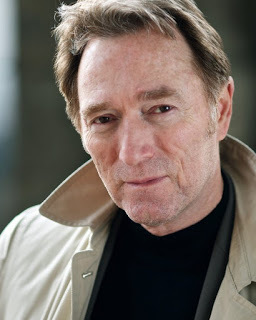
I am so thrilled that he and the others responsible for the film have agreed to talk with me about it. Thank you, thank you, thank you.
First, the info you need to know:
3 MINUTES RT 12:41
Written & Directed by Michael Medeiros
Cinematographer Nils Kenaston
Produced by Ilvi Dulack; Mark Woods
Executive Producer Michael Gallis
CAST
Tommy - Adam Cole
Laurie - Inge Uys
The Kid - Jacob Leinbach
Maddy - Tiz McWilliams
Earl - Lee Spencer Osario
WEBSITE:
FACEBOOK: https://www.facebook.com/3minutesthemovie/
Festivals pay a lot of attention to Social Media presence. Every Facebook "like" helps.
Crowdfunding page - to help cover post prod expenses and festival entry fees which are higher than ever this year. We are entering a lot of them to try to give the film as wide an exposure as possible.
And now, the interview.
This film is so different from your excellently dark comic Tiger Lily Road, which I also loved. What was haunting you that led you to 3 MINUTES?
MM: Like many people, as so many incidents of gun violence of the last few years unfolded one after another, I developed a sort of aching wish, sincere but unfocused, that something could be done about the problem. So when producer, Mark Woods came to me and proposed that we make this film, I literally leapt at the idea. I wrote the script treatment really fast - I guess because I’d already been psychically onboard for a few years.
ID: I come from a long line of story tellers. That was always the thing for me as long as I can remember and still is. Our talk around the table. When my Dad calls and says " how are you whats up whats going on" he is fishing for the story. And I usually have one, that has been on the simmer for a while waiting for the moment. If it is an especially good one we will revisit and review it and chew on it for a while.
3 Minutes is the story of what’s happening in our towns and cities and communities . When I read the script it was an immediate "yes" for me. Its a powerful tale of great courage, a love for the ages and the loss of innocence.
MW: A lack of comfortable and true self awareness that defines much of our culture. The apparently magnetic pull of group think/speak that takes all the color out of our human processes leaving us with black/white. I want to be a part of something more fluid and personally/culturally challenging than just pulling a lever for A or B. I want a different (kind of) conversation.
I am wondering if your experience as an actor help you with the incredible nuances in the performances. Can you talk about this?
MM: Yes, absolutely. I learned from personal experience, many many times that the actor is the play or film. There is no other way for me to look at it. There is a lot that a director can add, even impose but the smart ones know that what communicates the story is the impulse that rides on the actors breath. The actor is doing it right now. And when you see a great actor going through an emotional change right before your eyes, the experience is transformative and magical. And directors had best be creating the space for that. I think my experience as an actor has also helped me to recognize what’s what’s working and what each actor can contribute. We had a great casting director, but truthfully, I was a little nervous about casting this in a smaller talent pool. I had originally spoken to Tom Pelphrey about it - he was so wonderful in Tiger Lily Road - but his career has skyrocketed and he wasn’t available. Then I watched the tapes sent in by Adam Cole and Inge Uys and I couldn’t wait to meet them and I knew I could make the film.
And to go back in time: I studied acting with one of the greats in the American theatre, Uta Hagen. She was very big on bringing your own subjective truth to the work. This wasn’t so much a moral imperative, as a practical one. Any talented actor can certainly flounce around the stage and pretend to be something, say angry, and probably convince a lot of people. But the real magic happens when the actor brings a truthful alignment of their own life experience into serving the character in the play or film. There that’s my soapbox.
What deeply impressed me was how every minute serves the story, every image is calibrated for force. Even the wife’s shirt and long hair, which made me immediately think of the 1960’s and all that hope, were on target. Was all of this mapped out beforehand or did you improvise?
MM: Ah well, the 60’s. I have a huge nostalgia for that period and because I experienced some of it as a young person, it kind of feels like home to me. Probably, unconsciously I calibrate a lot in relation to it. We did a costume parade on Laura, I knew I wanted blues for her, and the hard part was that Inge looked good in everything. But this one top was a little bit of a throwback and spoke very quietly. It seemed to say, “here is a person who is unprententious, who has natural beauty and values and who will always give you the simple truth.” And that’s Laurie. With her and with the actor who played Tommy - they’re both very attractive - but I wanted the audience feel their beauty and their potential as human beings. And we only had a couple of scenes with little dialogue to get us there. I had several great, mad, last minute sessions with costumer, Ruth Bryan working things out for all the characters. We also had Nils Kenaston who was the cinematographer on Tiger Lily Road so even though we did some things differently there was a certain approach that was definitely mapped out beforehand. For the emergency room scene we made a lot of choices on the spot because we’d never seen the location before the day of shooting. It became a controlled improvisation developed through slow rehearsals, gradually increasing the pace until we were ready to shoot. It was great fun especially because we had an enthusiastic group of background performers who essentially all became principals.
P.S. from Caroline: Can I buy that shirt? #notkidding
What surprised you in making this film?
ID: When I realized that actors were driving 5-7 hours to be extras. That blew me away. Then that wonderful letter that actor wrote to me. He was the tall guy who was shot in the beginning. He did don't know what the film was about when he took the gig. When he arrived on the set we selected him to be featured. And shot. Apparently the same thing happened in his town a year or two ago. the whole experience for him working on our set resonated in a deep and powerful way and he was honored to be in the film.
MM: One thing that surprised me was the support we got from so many people who I could reasonably have expected to oppose us. You can’t make a film about gun violence without the help of some pretty conscientious people who know a lot about guns. It also surprised me that in working with some of them, I began to have a better understanding of their point of view. Of course, Mark Woods, our local producer was simply a genius at making connections to people and finding the way to make them feel comfortable about what we were doing and pursuing them and not giving up and finding out who they were and what they needed. I was also surprised by how much I enjoyed the visceral experience of working on set with guns and SFX. I can understand why so many films want to use them. They have a big impact and can change the atmosphere so quickly. Unfortunately, their constant use devalues the effect a great deal.
MW: Making the film surprised me. While I have produced nearly 150 fully mounted Equity stage productions (directed many of them too), they all happened in a contained and reasonably safe, controlled environment...a theatre. Making a film is like running for your life barefoot, partially blinded and with your ass on fire. And I want to do it again. That's surprising.
The universal level-headedness, patience, stunning work ethic, inventiveness and kindness of absolutely everyone working on this film surprised me.
So many locations in a handful of days, interacting with retail and service communities without so much as a cross look from any of them, speaks volumes about the fabulous character that defines most people if you just show honest respect. More of a reassurance than a surprise, really.
A number of people, helping to make this story, challenged our wisdom in questioning such a (growing) popular notion that everyone would be a lot safer if we all carried weapons. I am surprised at the immediate consideration given to the prospect that our real power lies in our ability to make informed and inspired personal choices.
In this terrible political climate, it’s really brave to release a film like this. Do you anticipate any trouble?
MM: One never knows but I don’t think so. While we were filming in July we were assisted by many responsible gun advocates - because I think they honestly felt the production was not aimed at misrepresenting them, or repressing them. The owner of the pawn/gun store where we filmed one scene was incredibly generous. Here’s a man who makes his livelihood selling guns and he opened his business at 5 AM for us to film a scene. And there was the guy who took me to the shooting range so I could get some experience with the weapons we’d be using in the film. What these and so many other interactions tell me is that there are many many people who are willing to have a conversation about this but they don’t want to be belittled or scorned or invalidated.
MW: Frankly, I don't see the point of anticipating it because making that choice will only weaken me. Furthermore, all we are asking and are likely to be asking in future projects is for our fellow travelers to participate in more conversations, too be curious and to experience the thrill of looking at ourselves and each other through a different lens
What’s obsessing you now and why?
ID: My hope is for the film to reach a wide audience, that will revisit and review it for a while and that it will play a part in the conversation for change.
MM: Yes, launching the film - getting it out to as wide an audience as possible - and at this stage that means festivals, getting the film into the right hands and making the right connections so that programmers will take a serious look at it. We went way out on a limb to make this project happen. It’s a bigger production than 99% of short films usually are. And to say that it’s straining our resources is putting it mildly. But we didn’t make the film to make money. We made it (as we keep saying in various ways) to try to stimulate a conversation. So the only real purpose in all of this is to get it out into the world and say, “let’s talk about it.” And to do that we’re looking for any kind of help along the way that people are willing to give us, whether it’s money, or a facebook like, or sharing the indiegogo page we’re about to launch, or connecting to someone who can open a door for us, it’s all helpful and good.
MW: Right now, we are completing the work necessary to share the film with as many people as possible There is still a lot of discovery in that process. That said, the real passion is about the conversation we hope to inspire.
What question didn’t I ask that I should have?
MM: You might have asked: “What makes you want to make films?” Well, sometimes I don’t. Sometimes it feels too hard. Some days you have to kick yourself in the ass a little. But with any artistic venture it’s such an enticing thing to create an alternate universe (I know you must feel this). But then there’s that old writer’s irony that says: “I don’t so much like the act of writing, but I love to have written.” I feel mostly the opposite. There are so many parts to the process of filmmaking and I’ve come to realize that I love them all. I love imagining the script. I love shooting. I love the solitary world of editing where you re-invent the film (and deal with all of your shooting mistakes). I love foley work because sound becomes music. Making a film uses and challenges all of my skills, every part of my existence up to and through the act of making it. And what you ultimately have to share is beyond description. It is the thing itself. And if you’ve done your job well, people don’t just understand what you mean, they experience what you mean.
Published on November 25, 2016 07:30
November 22, 2016
Garine Isassi talks about her musical novel, (it's filled with original lyrics) Start With the Backbeat, and about rap, rivalry, race and genre
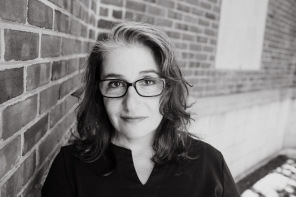
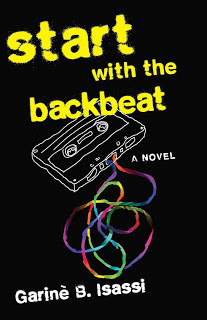
Singer/songwriter/bookwriter Garine Isassi has done something different, writing a "musical" novel, filled with lyrics, so of course, I had to interview her. This is her debut, too, which makes it more special. Thank you so much Garine, for being here.
For me, every book is like a haunting. I have to write to understand. What compelled you to write Start with the Backbeat?
It’s amazing that you use the word “haunting” in your question, because that is exactly how I was compelled to write this novel. It began simply as my personal memories. I've been in a few rock bands and spent quite a bit of time in nightclubs. I worked in a racially diverse office at a New York record label, during a time when most businesses were definitely not diverse. I witnessed a lot of clashing of culture as rap music rose to the mainstream, during the same time that alternative/punk rock and heavy metal were also hugely popular. I saw the highs of success and the lows of prejudice, sometimes within the same event.
In the years since, while I was busy writing creative non-fiction and news articles, memories of that time period in my life haunted me. Scenes danced in my head while I was falling asleep at night or while I was in the blank meditation of highway driving.
Then, I came down with a case of the “What If’s.”
What if I sang for that one executive? What if some of my former co-workers (specific and opposing personality types) had to sit in the same car together? What if their jobs depended on them melding their different musical passions and ethnic backgrounds?
What if? What if? What if?
I thought about writing a memoir, but, frankly, that idea scared the hell out of me. Finally I saw that I could use my knowledge of the music industry to illustrate some of the issues that I experienced in terms of race, social class, and culture. In order to show a larger truth, I felt that I had to write it as fiction.
I love the subtitle, a musical novel. Can you talk about this please?
Although I wanted to this book to be about some serious issues, I still wanted the tone to be light and funny - of course, with a bit of a cynical twist. (That’s what I do.) That said, I am a huge fan of the traditional musical comedy. So many of those films in the early days of Technicolor centered around show business and everyone was way too peppy - they were all like, “Let’s put on a show in the barn!” and would break into song in the middle of conversations.
It is so hokey that it is wonderful! I love movies like Singing in the Rain from the 1940’s to Grease from the late 1970’s and more recently School of Rock and TV shows like Glee and Smash. I wanted to create a novel where you felt the same impact of the songs as in those visual mediums.
Since it is so hard to describe music in text, I took the tact of writing in lyrics of full songs and working scenes around them with the characters’ reactions and feelings in ‘real time’. The songs in my book are not there as filler. They carry storyline and character development along.
Also, as a songwriter myself, it was important for me to convey the artistic need to express yourself musically. That is why I chose to have very different types of characters as the musical artists – a fragile starlet, a cocky showman, an almost shy rapper, a cool DJ. There is a video of me singing one of the five songs from the book, entitled Your Mirror, on my website.
Can you also talk about the diversity in the novel, and how we can get rid of stereotyping people?
Right now - post election - this issue is more important than ever! I believe that the main reason stereotyping exists is because of laziness. If I can pigeonhole you as a member of a certain group, then I don’t have to take any time or mental power to get to know you. If I can take the thing we disagree about and make that your whole person, then I can write you off. This is not just the majority against the minority. It is within communities, across political spectrums, and even within families! The problem with that, of course, is that no three-dimensional human being fits neatly into any one stereotype.
As I wrote Start With The Backbeat, I was exploring how people deal with that, especially in an industry where your persona is almost everything. The whole point is the importance of openness and authenticity.
While it is easy to recognize overt racism, we are all guilty of unconscious bias if nothing else. We assume all kinds of things about people based on their appearance, both positive and negative, without any real evidence – that a plump grandmother is likely to be sweet or a tall, beautiful woman is bitchy or a white man in a gimmee cap is an uneducated hick. That doesn’t make you a bad person. It makes you human. But becoming conscious of when you are doing it will bring you one step closer to breaking the habit of stereotyping people and closing them out.
This is a time when we have a real opportunity to get out of our echo chambers and really engage with people. We have to dig deep though. It is a brave act to respectfully converse with people who do not look like us, come from the same background, or who we may passionately oppose ideologically.
There is an amazing story about local African American musician named Darryl Davis, who spent time with members of the Ku Klux Klan in Maryland. Over years, he would meet with them and organize small groups to talk, listen, drink beer, etc. The KKK members had never been in real conversation with a black person before this! Just by engaging respectfully with them and following through, Darryl led many of them to leave the KKK – including the ‘Grand Dragon’ of the Maryland organization. Now there is no longer a branch of the KKK in this state! That is powerful. (Read about that story here) The bottom line, and I will quote Darryl here, is, “When you are actively learning about someone else you are passively teaching them about yourself.”
What kind of writer are you? Do you outline? Wait for the Muse? And how important is music in your writing?
As I mentioned above, I definitely waited for the muse to start this book! But once that hit, I shifted into “planner” mode. With a full-length novel that has multiple subplots, I didn’t want to risk getting them confused or ending up with a storyline that went nowhere. I actually used an excel file to track plot points per character and the key times where the subplots needed to intersect. I know that might sound a bit anal, but each character had to be in a certain place in their own journeys by the time of the plot’s climax.
I don’t write on a schedule, though. I am not the type who can sit down every day at a certain time and write. Finding the time and mental space to write is a challenge for me right now.
As far as how important music is to my writing, music informs everything I do. I can’t wash the dishes without the influence of music. It is ingrained so deep that it is just part of my thought process. But, I can’t have music playing while I write. I end up paying too much attention to the songs and get distracted. I also don’t want everything I write to be about the subject of music.
What's obsessing you now and why?
I am still obsessed with diversity and inclusion. I am also doing research on how it applies to the historic stories of American immigration – the proverbial ‘melting pot’ that wasn’t. Hopefully, this will lead me to my next novel.
Published on November 22, 2016 11:17
What does it mean to be loved for yourself? Real life Julia Pastrana was exhibited in freak shows as the "ugliest woman on earth," yet she was intelligent, spoke several languages, and even married. Carol Birch talks about Julia, and her ravishing new nov
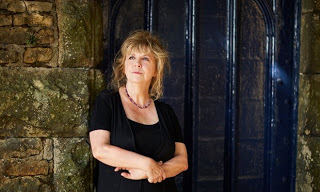
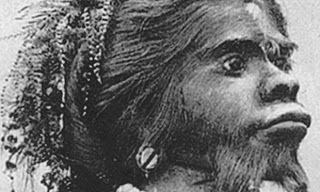 She spoke 3 language, yet was exhibited in freak shows
She spoke 3 language, yet was exhibited in freak shows 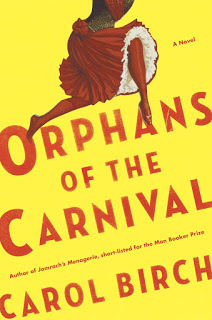
"Roll up, roll up, for a beautifully written novel about the poignant inner life of a 19th century freak show attraction, Julia Pastrana." The Guardian
Orphans of the Carnival is amazing. Truly. Carol Birch is the author of ten novels. Jamrach's Menagerie was shortlisted for the Man Booker Prize, long listed for the Orange Prize and shortlisted for the Galaxy National Book Awards. Birch won the David Higham Prize for Fiction for Life in the Palace and the Geoffrey Faber Memorial Prize for The Fog Line. She was long listed for the Man Booker Prize in 2003 for Turn Again Home. She has written for The Independent, The Times Literary Supplement, The Guardian, The Observer, The New Statesman, Talk of the Town and The Independent on Sunday, among other periodicals. She lives in Lancashire, England, with her husband and sons.Thank you Carol for talking with me, today.
I always imagine that writers are haunted by some inner question or need to write a certain novel. What sparked Orphans of the Carnival for you?
It’s true that something gets into the mind and then builds up until it reaches critical mass and demands to be written. In this case, I was haunted by Julia’s baby. Julia is quite well known, her baby less so. I was very moved by his fate. It’s hard to say too much without giving away so much about the book, but because this book is more than just a simple life story, though Julia is at the heart of it, her story led me to consider such things as the meaning we invest in physical objects, particularly those that reach us from the past, laden with significance.
I love the character of Julia Pastrana. She’s a sideshow attraction who is undeniably exploited, yet she still believes in the dream of love. But the question is can she have it – and that is the wrenching heart of this novel. Who are we really to ourselves and to others. Can you talk about this please?
Julia believes in love. Famously (and this is apocryphal) she said on her deathbed that she knew she had been loved for herself alone. Most people who’ve commented on Julia and her life seem firmly convinced that this was impossible, and Theo Lent is universally regarded as rotten to the core. Neither Theo nor Julia left any first-hand accounts, and hardly anything is known about Lent. While researching him, a more nuanced picture emerged. Significantly, his second wife, also a hairy woman, who survived him, spoke fondly of him. And the fact that in later life he seems to have been tormented by fear, regret and guilt, speaks volumes. Certainly he was a deeply flawed and unstable man. By all accounts Julia believed herself truly loved by him. No-one can know the reality, but I don’t buy the heartless villain/helpless victim scenario, and wouldn’t have been interested in writing about that. Apart from anything else, it demeans Julia.
I found something interesting during research. Theodore Lent is frequently confused with another showman, Lewis B. Lent. Two Lents in the show world of the time seemed a bit of a coincidence, and I wondered if the two were related. The family of Lewis B. Lent, of whom far more is known, owned a famous elephant, Old Bet. Old Bet travelled always by night so that no-one could see her. This maintained her rarity value and ensured that people would keep paying to see her. Her life was completely curtailed, a world of constant travel, darkness and staring crowds. When she died she was stuffed and put on show at Barnum’s American Theatre. This so chimed with Julia’s story. I wonder if our Lent was of that same family, perhaps a less successful branch, one that never made it big. Until he met Julia, his own Old Bet. Pure speculation, of course. I think he loved her in his own way, but it was complicated. It’s one of the things I was trying to work out while I was writing the book, as was the idea of who we are, as you say, ‘to ourselves and to others’. Julia lived at a time when her medical conditions were not well understood, when a top New York doctor could with a all seriousness publicly declare her ‘hybrid’, only part human. How did she see herself? Human, half-human, not human, object, stick of wood, toy – the emotion of love is not picky and lands where it will. Yes, she was loved, I believe. And it was complicated. Those who believe it was impossible do her a mis-service.
I was astonished to read that Julia Pastrana was a real character. What surprised you in your research? What did you embellish or add?
Some of this is covered in the answer to Question 2.
It’s true that Julia lived with the Sanchez family till she was twenty, but I made up the characters of the household. It’s true she went first to New Orleans, but her time there is all made up, as are the characters she travelled with.Rates and Beach existed but I know nothing about them. The story of her mother giving her to the vaqueros rings true, but there are other versions. I made up Cato and Ezra and Berneice. The meeting with Barnum and Van Hare happened, as did the military ball in Baltimore, the insults in the French press, the debacle of ‘The MilkMan Cured’, and her friendship with Friederike. The Russian characters are made up apart from Trettenbacher and Sokolov. Marie is real, also the circumstances of her meeting with Theodore Lent, their marriage and travels and eventual purchase of the wax museum in St. Petersburg. The bridge scene in St Petersburg happened.
The last section is true, but I gave the baby a fictional after-life, a kind of odyssey before he ends up where he can finally rest. I wanted to give him a kind of fictional closure, which he never had in real life.
I also loved Rose, the 20th Century woman who speaks to the dead. What made you decide to have her in the narrative instead of just focusing on Julia?
I needed the modern perspective because Julia’s story is not contained within the boundaries of her own life. Rose presented herself as a worthy foster-mother for lost things. I know the Rose character very well, she’s a mixture of people I’ve known.
What’s obsessing you now and why?
The usual things: the scary state of the world, time, mortality, staying sane, working stuff out in my head for the next book.
Published on November 22, 2016 11:07
Four girls in a convent, tension-filled group dynamics and more in Sarah Domet's amazing debut, The Guineveres

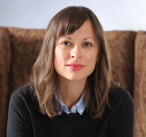
“Sarah Domet has brought forth some kind of wonderful miracle with The Guineveres.”—Kevin Wilson, New York Times bestselling author of The Family Fang
Sarah Domet's debut novel, The Guineveres, is getting stunning reviews. She’s also the author of 90 Days to Your Novel (Writers Digest Books, 2010). She holds a Ph.D. in literature and creative writing from the University of Cincinnati where she once served as the associate editor of The Cincinnati Review. Her short work has appeared in numerous journals, including Burrow Press Review, Beloit Fiction Journal, Potomac Review, Blue Stem, New Delta Review, Juked, Hobart, Talking Writing, and other places. In addition, her work has been anthologized in Sundress Publications Best of the Net 2015, New Delta Review Best of the Net 2010-2013, and Main Street Rag’s forthcoming Suspense Anthology. Originally from Ohio and still a Midwesterner at heart, she now lives in Savannah, Georgia.
Thank you so much for talking with me, Sarah!
Your premise, four girls all with the same name, abandoned at the same time, is genius. So what was haunting you in your life when you thought about this? Was there a question that you were wrestling with?
At the time I wrote The Guineveres, I was thinking about how much the stories of young women matter, but also how frequently our culture downplays their experiences, often as a way to elevate "more important"--or what I see as "more public"--stories. At the same time I was writing this novel, I was also reading Lives of the Saints, which only confirmed my suspicions. While stories of the male saints often described the valiant public deeds of these men, stories of female saints quite frequently highlighted the ways these women were left to privately suffer in their bodies. For female saints, their bodies became their best tools and weapons of faith, and so we see them refusing sex and marriage, marring their beauty with lye, starving themselves, sleeping on beds of stone and glass, and otherwise inflicting bodily pain. I was interested in exploring female embodiment as both limitation and possibility, and where better to investigate these questions than in girls on the cusp of womanhood?
I began writing The Guineveres shortly after I had taken a job that landed me in a town far away from family and friends. The novel seemed to spring, too, out of this personal experience of alienation and loneliness. As the draft progressed, it drifted further and further toward a meditation on the concept of home: the homes we leave and yearn for and create.
I also loved that this is a novel about and groups--the group of the convent, and the group of the girls--one which seems to imprison, the other which is freedom. Can you talk about this please?
I've long been fascinated with the group dynamics, particularly of women. Women have the impulse, or maybe just the willingness, to open themselves up to emotional intimacy that cements their group connection. At the same time, and because of this willingness, they also expose their individual vulnerabilities and, thus, become susceptible to attack. Certainly, there are risks and rewards to belonging to a group. On one hand, a group offers security and comfort; on the other hand, group-think makes finding one's own sense of identity infinitely more difficult.
I was one of maybe seven or so Sarah’s in my high school class, by the way, so I experienced this first-hand. How does one carve out an identity within a group? Or within a group that’s embedded within a group, the position in which The Guineveres find themselves? I choose to set this novel in a cloistered environment in order to bear down on the scrutiny—and the difficulty—of The Guineveres’ coming of age. I wanted to create a kind of modern fable, a world out of time that is simultaneously strange and universal.
The sequestered convent life was so rich and alive. What was your research like? Did anything surprise you?
I attended Catholic schools for twelve years, so much of my research involved shuffling through the file folders of my memories. My old high school was attached to a convent, and in my Junior year, or so, the convent opened up to provide additional classrooms. I was always a little in awe of the space, in part because of its beauty. But also because I felt like I was given a glimpse into the private lives of these sisters who, to me, seemed otherworldly.
This is just an astonishing debut. Did you have other novels tucked away in a drawer? What has it been like for you to publish and be so instantly lauded? Does it make writing the next book easier at all?
While The Guineveres is my first novel, I've had very healthy doses of rejection in my writing life (and in my life-life!) so the success hardly feels "instant" to me! However, writing a book without the expectation of an audience--without really considering if the novel would or wouldn't be read--was a gift. My hope is that I'll be able to replicate this headspace, which, I think, might require high doses of Buddhist mindfulness.
What kind of writer are you? Do you outline or wait for the elusive muse? Do you have rituals and talismans?
For me, each project is different. I do find outlines useful. When the logistics of plot are buttoned up, I can then free up my mental space for the more nuanced aspects of fiction, where I think the real beauty of a book lies. I've always loved Octavia Butler's suggestion: "First, forget Inspiration. Habit is more dependable.” If the elusive muse wants to find me, she knows I’ll be at my writing desk a certain hours each day.
What’s obsessing you now and why?
I’m fascinated with moments in history when we’ve been on the cusp of a cultural shift, often coinciding with particular technological advancements. Usually, we can only see such shifts in hindsight, so I find it peculiar when I hear people say: “We’re in the midst of a historical moment.” I wonder if we as a culture have become wise to history and the power of narrative—or if historical shifts will happen (or not happen) regardless of our desires. What can and cannot be predicted? My current project explores some of these ideas.
What question didn’t I ask that I should have?
Let me ask my Magic 8 Ball…It says you asked them all!
Published on November 22, 2016 10:43
The Zapruder film about the Kennedy assassination changed history. Now granddaughter Alexandra Zapruder reinterprets it in her incredible new book, Twenty-Six Seconds
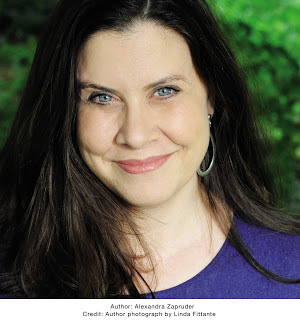
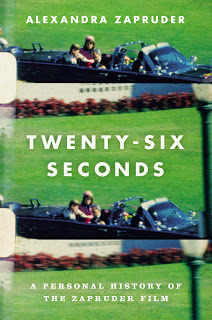
Alexandra Zapruder began her career as a member of the founding staff of the United States Holocaust Memorial Museum in Washington, D.C. A graduate of Smith College, she served as the researcher for the museum’s exhibition for young visitors, Remember The Children, Daniel’s Story. She earned her Master’s Degree in Education at Harvard University in 1995 and returned to the Holocaust Museum in 1996.
Her first book, Salvaged Pages: Young Writers’ Diaries of the Holocaust, (Yale University Press, 2002) won the National Jewish Book Award in the Holocaust category. She wrote and co-produced I’m Still Here, a documentary film for young audiences based on her book, which aired on MTV in May 2005. The film was awarded the Jewish Image Award for Best Television Special by the National Foundation for Jewish Culture and was nominated for two Emmy awards.
Thank you so much for being here, Alexandra.
What would you have asked your grandfather if you could have?
I think I would have liked to ask him a lot of questions – about his life in Russia and his family, about his experiences in New York and Dallas, about his interests and abilities, about his philosophies and ideas. Growing up, I missed him very acutely. But it wasn’t because of the film. It was because he was so loved in our family and he was such a character. I would have liked to know him and spend time with him.
The book is a page-turner, and a kind of thriller, too. How did you devise the structure of it?
I felt strongly that this book needed to adhere very strictly to a chronological structure. This is because Kennedy’s assassination and, to a lesser degree, the existence of the Zapruder film set events in motion and it’s impossible to understand the reverberating effects of those events without seeing them in their time. I also wanted to trace the life of the film across the decades as cultural mores and technology changed. One of the most fascinating things to me is that the film never changes – it’s always the exact same twenty-six seconds – but everything around it keeps changing and interacting with it in radically different ways. This is what makes the story so wonderful – it had a natural arc and all I had to do was follow it.
The book is absolutely fascinating. Can you talk a bit about what you learned about your grandfather, the film, and the assassination that you didn't know before?What didn’t I learn? I knew so little going into this that it was a massive education for me on every level. On a personal note, I really appreciated the opportunity to gain a much fuller, more accurate sense of who my grandfather was. He was such a special person and I always missed knowing him so it was wonderful to get to create a vibrant, compelling portrait of him. In terms of the film, I was truly stunned to realize how deeply imbedded it is in American life. I just didn’t appreciate its significance outside the JFK assassination community – the way it sparked new and provocative questions for the media, in the legal community, and for filmmakers, novelists, artists, among others. In many ways, learning about the film is like taking a crash course in the second half of the 20thcentury.
What was it like for you writing this book? Was there ever a moment when you thought, I can't do this?There’s always a moment – or several – like that when writing a book, I think. In this case, the amount of research and the complexity of the material was very daunting, and there was such a steep learning curve that I definitely had moments of overwhelm. But the project was to take that huge amount of material and tame it for the purposes of this book, to stay closely focused on the film itself, and to trace the intersecting life of our family and the film in order to gain a deeper, new understanding of what the film means and why it matters in history. And ultimately, I loved writing this book. It was not only that the subject is inherently complex and compelling in just the way I like history to be, but I also got to write about my own family, who I love very much, and think about our complex legacy. It was deeply meaningful to me, in the end.
What's obsessing you now and why?Well, like the rest of America, I’m obsessed with the election, and not in a good way. But by the time this is published, it will be over and hopefully we won’t find ourselves under the thumb of a demagogue. On a more personal and private level, I’m bracing myself for the launch of this book and wondering what effect it will have on our family. Also, I had a deep visceral need after I finished the book to take a break from cerebral, brainy kind of work so I took a note from my 11-year-old daughter and started coloring. I found these gorgeous coloring books by a wonderful artist who focuses on images from a particular city, like Paris, or a country like Japan. I have spent a small fortune on finding the perfect pens. I find it strangely gratifying – and very restful – to just make something uncomplicated and pretty.
What question didn't I ask that I should have?How can readers learn more about me and my books? That’s an easy one. Go to www.alexandrazapruder.com.
Published on November 22, 2016 10:31
Her overweight father turned her into a nutritionist: Dawn Lerman talks about her hilarious (and helpful) book about family and food, MY FAT DAD: A MEMOIR OF FOOD, LOVE AND FAMILY, WITH RECIPES
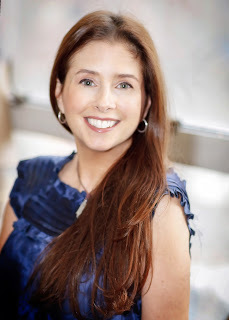
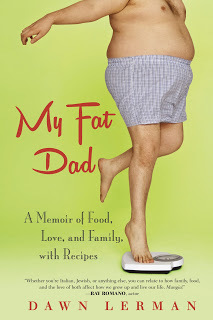
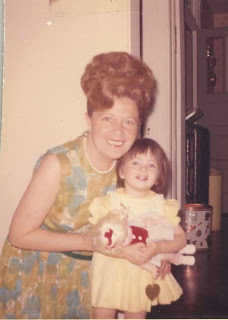 Dawn and her mom, Beauty
Dawn and her mom, BeautyI'm so happy to have Dawn Lerman here to talk about My Fat Dad. Dawn Lerman is a New York-based health and nutrition consultant and author of “My Fat Dad: A Memoir of Food, Love and Family, With Recipes.” Her series on growing up with a fat father appears on the Well blog of the New York Times http://www.nytimes.com/column/fat-dad
“Dawn Lerman grew up Jewish in the 70's. I grew up Italian. Might sound different, but for the most part, it’s the same. Especially when it comes to food. The philosophy was simple, food = love. My Fat Dad hilariously and poignantly captures that essence Whether you’re Italian, Jewish, or anything else you can relate to how family, food, and the love of both affect how we grow up, and live our life. Mangia!”—Ray Romano, Emmy award-winning actor
First, the why now question! What made you want to write this book. My Fat Dad? What were you trying to find out about yourself or about others?
I originally set out to write a health book for kids about snacking. While I was compiling recipes I realized that each one of them had a memory attached to it. The memory was as important as the recipe —it was the people I was with at the time; where I was when I tasted it; and the smells that made it so important.
Nourishing yourself and your family is about the love you put into it, which led me to want to share about my family and my maternal grandmother Beauty, whose weekly recipe cards saved me and gave me a purpose when I moved away from her at age 9 for my dad’s life changing job at a top NYC ad agency. I was able to focus less on the chaos and loneliness I felt in my day-to-day life. The story of how home cooked food had such a positive impact on my life, even in the face of my father’s obesity struggle, felt like an important story. I wanted to provide the color and context around the recipes that were woven into the fabric of my life.
I love how you figured out that food was equated with love, and that what we eat really does make a difference in how we feel. How did you learn to understand this (My mother-in-law still believes that food has nothing to do with health.)
I grew up with a 450 dad who was always one diet away from the perfect weight loss miracle. Every week he would rotate to a new fad diet, and my family ended up eating whatever freeze-dried, saccharin-loaded concoction he was trying at that moment. By the time I was 9, I was an expert on Atkins, Weight Watchers and even prayed beside him after he read, I Prayed Myself Slim.
My mother, on the other hand, never understood what the big deal with food was and ate only one small meal a day while standing up and chatting on the phone. Most weekday meals consisted of my dad’s diet foods, a meal replacement shake, or a bagel or pizza in the car. What I remember most about those early years, is that I was always hungry — hungry for food, hungry for nice clean clothes, hungry for someone to notice when I ran away from home or hid in the closet for hours. I was just hungry — hungry for someone to care for me because I was a child and I yearned to be cared for.
But on Friday nights, my maternal grandfather would pick me up and when we arrived at my grandparents’ home, the table was always set with beautiful china. There was always a pot of chicken soup cooking on the stove, a freshly drawn bath, and a fluffy, lavender-smelling nightgown waiting for me. It was at my grandmother Beauty’s house where I learned what true nourishment was. It was the only place I can remember feeling happy, safe and nourished. It was what I craved. Her famous mantra was,
“Good food is not fast. Fast food is not good and if you know how to make a pot of chicken soup, you can nourish yourself for life.”
How do you feel your dad's attitude toward food both before and after his diet has affected the way you eat?
My dad was a yoyo dieter. In a period of a year my dad went from 450 pounds to 175 pounds back to 300 pounds. He was either on an extremely restrictive diet, like when he lived at the Fat Farm at Duke University for 6 months--eating only white rice, or on
the other side of the pendulum, eating everything and anything –“The Mad Men Diet” —Martinis, steak, and blackout chocolate cake. No matter which plan he was adhering to, it always involved extremes and there was not a lot of reflection on how eating different foods make you feel.
What he ate or did not eat was always based on the number on the scale or the ad campaign he was working on. My dad felt that in order to create a good campaign, you needed to believe in the products you were selling. He was always the best customer for the products he advertised. He was responsible for iconic slogans such as “Coke Is It,” “Soup is Good Food,” and “Leggo My Eggo. Instead of bookcases, my dad had shirts of every size stacked in every corner of our house-- representing different weights.
I have always been health conscious, not weight conscious. Then and now I never liked processed foods. Eating healthy and cooking for myself even as a young child brought me a sense of stability and connected me to interesting characters; like the homeless man I invited to live with me when my little sister and mom were on the road with the national tour of the Broadway show Annie, and the cafeteria lady at my school who was more helpful to me then the school therapist when I started living alone at age 13.
What's obsessing you now and why?
My main focus is really what it always has been, trying to teach kids about the importance of nutrition and teaching them how to cook. I am in the process of writing a cookbook for kids When kids are involved in the process of meal preparation they are more likely to try new foods and have a connection to their family traditions and culture.
My maternal Grandmother Beauty, was not particularly religious but she often said she could find her heritage in a bowl of matzo ball soup. I grew up inspired by her words and enjoy sharing her teachings.
What kind of writer are you? Do you have a system? Any rituals?
I have written daily for as long as I can remember. I used to carry around a little journal and pretend I was Harriet the Spy. Writing has always been my way to process my feelings. I can spend a whole day in a little nook in my kitchen trying to string together the perfect sentence, or trying to create dialogue that makes the people I am writing about jump off the page. Before I start, I always prepare a pot of Matcha Tea with chia seeds, protein powder, and coconut oil for focus and energy.
What question didn't I ask that I should have?
What do you want people to remember about your story?
I hope my story helps families create happy memories around food. I also hope that “food” is seen to be more than just the macronutrients, protein, fat, or carbs from which it is composed. I have always had a passion for taking any family recipe and making it more nutritious—I hope readers can see that healthy food can taste good and you don’t need to give up your traditional favorites if you are willing to exchange a few ingredients (There is an index at the back of My Fat Dad that explains what you can use as a substitute for most of the basics that go into every recipe).
I believe everyone has a food story to tell. My Fat Dad is mine.”
And my dad is now 220 pounds and vegan, how he got there is a story I share in my memoir and on the Well blog on the NY Times.
Published on November 22, 2016 10:31
November 8, 2016
A great granddaughter's quest for her lost art legacy: Elizabeth Rynecki writes about her profound journey in crafting Chasing Portraits
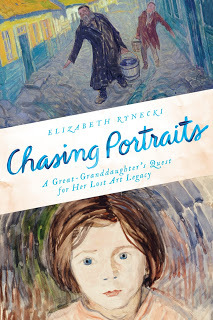
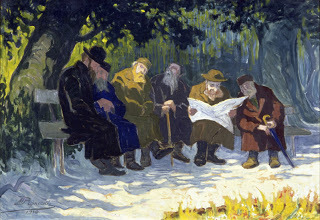
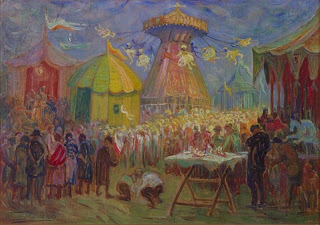
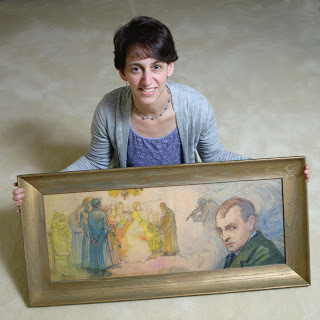
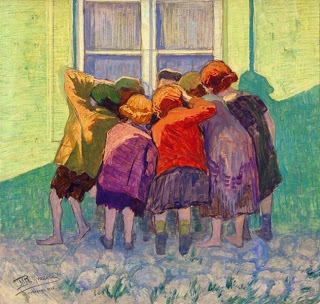
I'm thrilled to host Elizabteh Rynecki writing about her amazing book, Chasing Portraits. Thank you so, so much, Elizabeth!
Taped to the outside of my office door is a poster from my documentary film Kickstarter campaign. It’s a montage of my great-grandfather’s paintings along with a few behind the scenes photographs. On the inside of the door is a hurriedly scribbled warning: “KEEP OUT! I’m filming,” which I put outside to drive away distractions (or family members generally) when I am actually filming in my office. I don’t film too often, but it is grand central for the Chasing Portraits project.
For a project that once was a hobby, Chasing Portraits has pretty much taken over my life. The room reflects the myriad of roles (researcher, genealogist, art-historian) I’ve assumed over the years: piles of academic articles, bookshelves crammed with Holocaust memoirs, and cabinets filled with documents Grandpa George saved from the Second World War.
I like to write in my office early in the morning. Not yet distracted by the days’ demands, still warm and toasty in my pajamas, I glare at the computer monitor, hoping the story I seek to tell will somehow magically end up on the screen in front of me. As much as I’d like writing to be a joyous affirmation that just flows from mind to screen, most often for me it is a struggle to get the right words down, and then to edit them to say what I actually meant.
Last year my multiple responsibilities momentarily converged. On the one hand I faced the task of writing an emotionally difficult closing chapter of my book about an Israeli woman in possession of my great-grandfather’s paintings, while at the same time I needed to film a journal entry on my feelings about the situation. It was a moment whose details had not yet played out and as I prepared to film myself, the author in me tried to step back and figure out how to commit the scene to paper.
After I set up the HD camera on a tripod, I tested the mic, sat down, and looked at the LCD screen to assess my bedhead hairdo. That’s when I realized I was still wearing pajamas. Pajamas, because they are so comfortable, are absolutely brilliant attire for writing a book. They are not, however, ideal for showing oneself in the best light on film. But there I was, at 6am, focused on my thoughts about the Israeli collector conundrum while I wondered aloud, “Should I really film this in my pajamas?” As it turns out, expedience (or perhaps laziness and a desire for comfort) trumped vanity: I didn’t change my clothes.
I’d sort of forgotten about the moment, until the other day when Tina, my documentary film editor, included it in a clip she was thinking of using in the film.
“You can’t use that!” I said. I was mortified. No one would take me seriously. I looked, well, I looked like I was wearing my pajamas.
“It shows how you’ve really changed over the course of the project,” Tina said.
Tina, of course, was right. Eight years ago, when we filmed our first segment, I cared a lot about what I looked like on camera. It wasn’t that I didn’t care anymore, but for me the focus had shifted to the story itself, rather than being about me. To the extent I was in the story, I wanted to just be myself, rather than some idealized version of me, although watching myself in pajamas on film is still slightly horrifying.
I’ve learned to be strong in the Chasing Portraits project. Persistence and perseverance move me forward, help me to reach my goals. But I’ve also learned to be more vulnerable both on paper and on film. I hope that in the end, that vulnerability allows the reader and audience a way to get a little bit closer to understanding not just me, but the story of my great-grandfather’s art and my search for it that is the heart of Chasing Portraits.
--
Published on November 08, 2016 09:58
Harriet Levin Millan talks about her profound novel-based-on-a-true-story, How Fast Can You Run, about a South Sudan refuge searching for the mother he was separated from when he was five.
“The best war novel told from a young boy’s perspective since Jerzy Kozinski’s The Painted Bird.”
—Nyoul Lueth Tong, author of There is a Country: New Writing from the New Country of South Sudan
Prepare to be amazed. When One Book, One Philadelphia asked author and Drexel University professor Harriet Levin Millan to choose ten of her undergraduate creative writing students to interview ten South Sudanese refugees for a special One Book writing project, she met Michael Majok Kuch, who became the subject of her novel. . Kuch survived the torching of his village in South Sudan, and was separated from his mother when he was only five. His quest to be reunited with her, and the plight of the refuge is both profound and moving. Thank you so much Harriet, for being here.
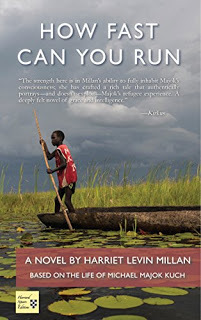
I always say every book starts with a yearning. What was yours?
My yearning was for Michael Majok Kuch, the S. Sudanese national, I based my novel on, to see his mother. They had been separated since Michael was five-years-old and their village was attacked in the middle of the night and they got separated. So by the time I met him, when he was a senior in college, he hadn’t seen her for nearly 22 years. At the time, my own son was a high school junior starting the college application process, which to me felt bittersweet. On the one hand, I was so happy he had done well enough in high school to apply to college, yet on the other hand I was distraught that his childhood was over. I guess you could say that I was in a state. So when I met Michael, I projected his longing for his mother onto my longing for my son, but it was my son, Josh, who really started the process of getting Michael and his mother together. After Josh heard that Michael hadn’t seen his mother in so long, yet had recently discovered that she was alive and had been relocated from a refugee camp in Northern Kenya to Brisbane, Australia, Josh dropped his video controller, interrupting the game he was playing and rushed to hug me and said, “I don’t know what I would do without you, Mom.” So that was how the Reunion Project was born and we fundraised to reunite Michael and several other S. Sudanese nationals. I constructed the book’s arc around this quest. So although I used a reportorial style and kept myself out of the novel’s narration, I always saw the book as the story of two sons and two mothers, Michael and his mother, and Josh and me.
What kind of writer are you? And did your usual process differ at all with this book?
I am a very disciplined to the point of obsessiveness. I can sit for up to 12 hours and write. But I am also extremely disorganized and rely on memory a lot. I started out as a poet and I write a lot of my poetry in my head just walking around. When I was a MFA student at the U of Iowa, I was fortunate to have studied with Larry Levis. I took a course Larry taught called the 100-line poem. I wrote my entire 100-line poem in my head, same with many poems in my first book, The Christmas Show. So I continued that process once I turned to fiction. I don’t really take notes or outline. I always think about the plot and where the character is going as I go about by daily activities. I project my character onto everything I see and do. Then when I sit down to write, I just bring that part of my day to life, even if the setting is different. In that case, I may make the character do things I’ve done that day such as shop in a market or lose her keys, things that I do. For How Fast Can You Run, I really tried to be more organized. The book is based on conversations with a real person, Michael Majok Kuch. Mike and I met several times a week for about three years. I both recorded those conversations on tape and wrote stuff down as Mike talked to me. But because I’m so disorganized pretty soon I started relying on memory to get me through. There was just so much information that I used the incidents that I remembered most, believing they were the most impactful. I have a very good instinctive organizing sense of writing from having written for over thirty years. It’s almost like driving with an automatic car instead of a manual one. I don’t need the outline or gearshift to get into action, I just let the writing do the work.
What kind of research did you do, and what was that like? Did anything unmoor preconceptions that you might have had? What surprised you the most?
Talking with Michael was an immense honor. No history book holds this information. The stories Michael told me aren’t written down anywhere, stories such as the UN making food drops and thousands of refugees running toward the hundred pound bags of grain as they fell down from the skies and the bags actually landing on people and killing them! Where would that information be recorded? Besides getting to know Michael and hearing about his life, I immersed myself in the S. Sudanese community for about three years. I also traveled to S. Sudan and Kenya, which was absolutely necessary. I felt that I couldn’t write about S. Sudan and Kenya without actually putting my feet down on the land, smelling its flora and experiencing it. And I was right! I got such valuable information on those trips. I even met a Kenyan truck driver who was one of the original aid workers who brought water to boys like Michael who had trekked through the desert for months toward the Kenyan border. His name is Sampson and I wrote an homage to him in the book. And although I couldn’t get a permit to visit Kakuma Refugee Camp where Michael lived for ten years, I flew 1,000 miles to see the landscape around Kakuma Refugee Camp so that I’d be able to write about it. I also read just about every book I could find on S. Sudan, very article. I learned to cook S. Sudanese food, learned some of the language, attended Save Darfur rallies and traveled to meet some prominent S. Sudanese people who lived in the US. I always teach immersion whether I’m teaching creative nonfiction, fiction or poetry. I’m a tactile person.
The whole refugee experience is both so horrific and so triumphant.
What can the average person do to help them—and to change the fear that ignorant people have about them coming into our country?
Something I learned from Mike is that many refugees just want to be known. We think they’ll ask us for things like money or jobs and we don’t get near to them because we don’t necessarily have those things to give. But it’s not true. Most of the refugees I met from Sudan and the Darfur region particularly, asked only one thing of me and that was to spread awareness. Sudan doesn’t make the news very often. Unless you are in the habit of looking for news from Sudan on the internet, you probably won’t find it. I really think that the term refugee needs to be looked at. Right now, refugee might make you think of someone really skinny or ill or in need. Other words such as new immigrant, expat and in exile are much more attractive. But in fact, many of our histories are lost because our grandparents or parents did not want to be called refugees. All four of my grandparents were refugees escaping pogroms in Russian or Eastern Europe, but I know nothing of their past because they so badly wanted to be identified as American. I don’t know their real names or language or the name of the towns they came from. Their histories are erased. This is a great tragedy. Our understanding of the word refugee needs to be improved. To my mind, based on the refugeesI have met, the word means ‘indomitable spirit.’ Refugees are heroes. Writing about my book, Ken Kalfus said that “refugees are the heroes of our times.” Presently there are 65 million refugees on the move worldwide, many of them under the age of eighteen. Something needs to be done. Too much is at stake. Why are there closed borders? Why is human immigration not an uninalienable human right. What I think people need to do is to start reaching out to one another, start respecting people whom they perceive as other and changing the perceptions of refugees from the down trodden to inspirational. That would be a great first step.
What’s obsessing you now and why?
The whole experience of getting this book out there, especially during this present political climate has been an education. The book is published by Harvard Square Editions, a small independent press affiliated with Harvard University. I did have a big agent in New York trying to sell this book. She loved the book and sent it out 19 times. When she couldn’t sell it, I broke with her and decided to try the independent presses. The fifth press I tried, accepted the book. I didn’t know at the time that my book, published by an independent press, would not be in book stores, that it would not be reviewed heavily and that people would not have access to it, unless they somehow heard about it and sought it out. I didn’t know how the big presses control what we read and think. This is just another example of how our capitalistic society so controls us. I even tried to hire a publicist, but all the publicists I interviewed turned me down because my press wasn’t big enough and they were afraid they wouldn’t be able to do much for me. These were publicists with exuberant fees. Even if I could have afforded the thousands of dollars they’d have charge to work with me, they didn’t even want to take my money! So, with the help of Harvard Square Edition’s in-house publicist, I did everything myself and managed to get events, interviews and even to get featured on NPR. I’ve vowed to teach books published by independent presses in all my classes. I’d never restrict myself to listening to the top 40 radio, so why would I not explore the independents? I’m not sure how many readers are aware of how limited their choices are and how the big presses control their reading material. I think the internet has changed this somewhat and of course, blogs such as this one, but we still have a long way to go.
What question didn’t I ask that I should have.
The move from writing poetry to fiction was quite the experience. I studied poetry at Iowa but never studied fiction. I had to teach myself to write it. It took 12 years. I wrote two other novels that I felt weren’t good enough to publish. I signed up for writing workshops along with my Drexel undergraduates and also studied with Tom Jenks and attended SLS Summer Seminars and took One Story’s workshops on line. I joined writers groups and got feedback. I leaned on the support of some of my writer friends, particularly women writers. I joined Binders which changed everything. This group is offering a new paradigm of women helping women. It’s a brave new world of writing and I’m glad to be a part of it.
Published on November 08, 2016 09:43
November 5, 2016
Ya hoo! Bill Wolfe, the extraordinary blogger/reviewer at Read Her Like An Open Book, has opened an editing service, Argus Editorial Services

See that smiling face above? That's Bill Wolfe, one of the best literary citizens I know. He truly supports writers and he runs this highly acclaimed blog Read Her Like An Open Book where he reads and reviews books only by women. How cool is that? And now he is opened Argus Editorial Services, and being a literary citizen myself, I want to support him and tell everyone you can't hire anyone better (or kinder or funnier.) Thanks for letting me interview you, Bill!
Why did you decide to start this business?
I decided to start an editing business when I left my job as a high school English and Journalism teacher after 19 years. I was unhappy with school politics and ready for a new challenge. And my primary skills involve reading, writing, and editing. I’ve been teaching and using those skills every day for the last two decades as an English teacher and Journalism teacher/newspaper adviser.
Who would benefit from Argus?
Argus Editorial Services is open to any writer, publisher, business, or nonprofit that needs help improving the quality and clarity of their writing. I suspect a majority of my clients early on will be women simply because I’ve been publishing a blog about literary fiction by women for 3 ½ years. And that’s fine with me. The future that has belonged to women is now the present.
What are the most common mistakes writers make?
The most common mistakes are the type of mistakes we all make. Even the best writers. No one is perfect. It really does take a team to produce near-perfect writing. That’s why writers have editors and agents, and newspapers, magazines, and websites have a staff to maintain quality control over their communications. Good writing is rarely, if ever, achieved alone. I see mistakes in subject-verb agreement, usage, and punctuation, as well as problems with repetition of words and phrases. The author is too close to the writing, so he or she can often no longer see it clearly. But most of all, I see unpolished writing: a good idea awkwardly expressed. My job is to smooth it out, clarify it, and then polish it so it shines the way it should.
Do you have a preference for the kind of writing you like to work on?
]I like working on virtually any kind of writing. I’m curious about everything, and I always learn something from the writing I edit. I enjoy all kinds of fiction, most nonfiction (especially travel, politics and history, biographies, and memoirs), and even technical or industry writing in areas in which I have some interest or expertise. I just enjoy the process of reading and editing. I like seeing a piece develop and fulfill its potential, much like watching a student blossom into a better reader, writer, and thinker. Both are very gratifying.
What's obsessing you now and why?
I’m always obsessed about something (or several things). I think that’s something that writers and editors have in common; we’re obsessive-compulsive by nature. Lately, my obsessions concern the presidential election, various socio-political issues (especially gender and minority group issues), and baseball (Can the Dodgers make it to the World Series for the first time since 1988? No? OK, can the Cubs win the World Series for the first time since 1908?).
What particular strengths do you offer as an editor?
I’m equal parts reader and writer. I occupy both roles while I work. As a reader, how am I responding to this work? Am I engaged, confused, bored? As a writer, I can see how problems or weaknesses came to exist in the writing and then determine how best to remedy those issues. I have an eagle eye for mistakes; they jump out at me like a flashing neon sign. (And yes, I realize that “eagle eye” is a cliché, and I would not allow it in a piece I’m editing.) Finally, I believe in transparency. I maintain an open line of communication with the writer so that together we can create a polished and effective piece of writing.
Published on November 05, 2016 11:29



